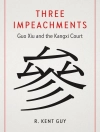This study of the philosophy of war in early China examines the recurring debate, from antiquity through the Western Han period (202 BCE–8 CE), about how to achieve a proper balance between martial (
wu) force and civil (
wen) governance in the pursuit of a peaceful state. Rather than focusing solely on Sunzi’s
Art of War and other military treatises from the Warring States era (ca. 475–221 BCE), Christopher C. Rand analyzes the evolution of this debate by examining a broad corpus of early Han and pre-Han texts, including works uncovered in archeological excavations during recent decades. What emerges is a framework for understanding early China’s military philosophy as an ongoing negotiation between three major alternatives: militarism, compartmentalism, and syncretism.
Military Thought in Early China offers a look into China’s historical experience with a perennial issue that is not only of continuing relevance to modern-day China but also pertinent to other world states seeking to sustain strong and harmonious societies.
Innehållsförteckning
Preface
Prologue
1. The Emergence of the
Wen/
Wu Problem
The Achievement of Balance
The Western Zhou Solution
Evolution in Chunqiu Times
New Solutions in the Zhanguo Era
Militarism
Compartmentalism
Syncretism
Conclusion
2. The Metaphysics of Generalship
The General as Sage
Psychical Power
Metaphysical Dynamics
The Ultimate Battle
Conclusion
3. The Practical and Meta-Practical
Organizational Models
Training and Administration
Military Law
War Preparedness
Intelligence Measures
Collection and Analysis
Deception and Covert Action
Views of Military Thinkers
Conclusion
4. The Moral Dimension of War
Laozi
Kongzi
Yanzi
Mengzi
Xunzi
Mozi
Songzi
Military Thinkers
Conclusion
5. The Permutations of Western Han
Realignment of Solutions
Wen/
wu and Foreign Policy
A Double Paradox
Effects of Social and Institutional Changes
Conclusion
Epilogue
Notes
Bibliography
Index
Om författaren
Christopher C. Rand is an independent scholar who received his Ph D in Chinese history from Harvard University. He is the cotranslator (with Joseph S. M. Lau) of Ts’ao Yü’s
The Wilderness.












